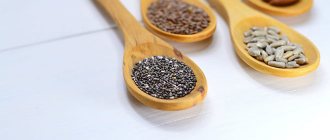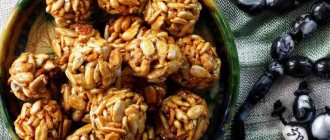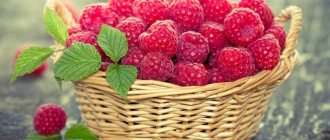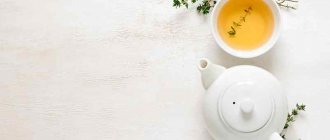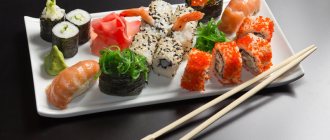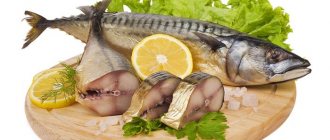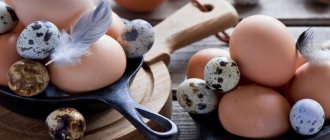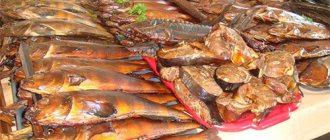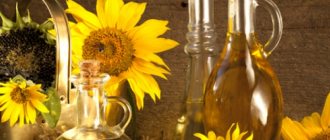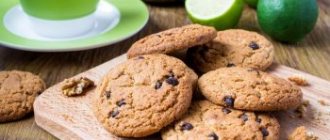Benefits for nursing
White, or peeled, pumpkin seeds are deservedly popular, because they contain a large amount of biologically active substances:
- zinc – has a beneficial effect on the skin and hair, strengthens the immune system, regulates blood sugar;
- copper – takes part in hematopoiesis, helps saturate cells with oxygen;
- Cucurbitin is a substance with antiparasitic action;
- oleic and linoleic fatty acids - are not synthesized by the body, but are essential for regulating metabolism and cholesterol levels;
- vitamins C, K, B1;
- manganese, magnesium, phosphorus, iron, etc. - take part in important processes in the body;
- vegetable protein – easily digestible, helps restore damaged tissues, promotes the functioning of immune cells.
How to give pumpkin seeds for parasites to a child.
The highest concentration of nutrients is not in the seeds themselves, but in a thin greenish film under the skin. But when fried they are destroyed.
What are the benefits of pumpkin seeds during breastfeeding?
Everyone knows about the unique properties of pumpkin. Therefore, new mothers are often concerned about the question: is the dietary orange vegetable allowed and whether a nursing mother can eat its seeds. Medical workers answer in the affirmative.
It has been proven that seeds, 100 g of which contain an unprecedented amount of biologically active substances, are no less useful during breastfeeding. They include:
- about 20 amino acids (essential and essential);
- saturated and unsaturated fats;
- vitamins E, A, C, D, K, group B, niacin, lutein, beta and alpha carotene;
- zinc, phosphorus, calcium, magnesium, potassium, selenium, manganese, iron, copper - minerals and trace elements;
- curcubutin;
- glycosides, alkaloids.
If you include this herbal product in the menu, it will have a beneficial effect on your overall well-being.
For the female body, the benefits of pumpkin seeds during breastfeeding are as follows:
- enrichment with vitamins and minerals necessary to restore the body after childbirth;
- stabilization of the digestive tract, improvement of intestinal motility;
- normalization of metabolic processes, reduction of glucose concentration;
- removal of toxins;
- improving the functioning of the circulatory and nervous systems;
- energy supply;
- protection and softening of the skin, strengthening bones and teeth;
- strengthening blood vessels, increasing immunity and hemoglobin;
- improving mood, relieving fatigue, restoring hormonal levels;
- increasing the fat content of milk;
- restoration of reproductive system functions;
- normalization of sleep, help with depression and neuroses that often accompany a woman during the postpartum period.
Another advantage of pumpkin seeds is that, unlike sunflower seeds, sesame seeds and others, they are hypoallergenic and practically safe for the baby.
In addition, entering the newborn’s body through breast milk, pumpkin seeds contribute to the development of its vital organs and systems.
The only thing that young mothers who care about their figure should remember is that pumpkin seeds are a high-calorie product. 100 g contains 546 kcal, so you need to follow the measure. A safe dosage is 35 – 80 g per day.
Pumpkin or sunflower?
Choosing between black (sunflower) and white (pumpkin) seeds is not just a matter of personal taste, especially when it comes to breastfeeding. Let’s compare their key beneficial properties, and each mother can draw her own conclusion:
- Sunflower grains contain more vegetable protein, phosphorus and vitamins.
- Black seeds hold the record for the amount of selenium, while white seeds lead in the content of zinc and copper.
- Sunflower is more active than pumpkin in accumulating substances from the soil. This is important because today plants are increasingly grown industrially using chemicals.
- Sunflower seeds are often eaten fried. This is a more allergenic and difficult product for the gastrointestinal tract.
- White pumpkin seeds, unlike black ones, practically do not change the taste of breast milk.
Is it possible to eat pumpkin (watermelon) seeds during breastfeeding and what are their benefits?
Pumpkin seeds are good for health, however, few people delve into the essence of the issue and know exactly how they affect the body. They are recommended for use by both children and adults. The period of breastfeeding is no exception. The value of the product is not only echoes of traditional medicine; scientific studies have confirmed the benefits of pumpkin seeds for breastfeeding. They are rich in vitamins, minerals and other biologically active substances:
- fats;
- amino acids;
- cucurbitin;
- B vitamins;
- vitamin A;
- folic acid;
- potassium;
- calcium;
- magnesium;
- phosphorus;
- sodium, etc.
Pumpkin seeds have a beneficial effect on the health of nursing mothers and babies.
This composition has a beneficial effect on the female body, exhausted by pregnancy and childbirth. Regular use will help you recover quickly. In addition, pumpkin seeds have the following beneficial properties:
- normalization of metabolism;
- improving the functioning of the gastrointestinal tract;
- replenishment of the body's energy reserves;
- decreased blood sugar levels;
- improving the functioning of the cardiovascular system;
- removal of toxins and waste;
- improvement of the condition of the skin;
- strengthening the defense mechanisms of the immune system;
- normalization of hormonal levels;
- improvement of lactation;
- getting rid of worms;
- increasing the nutritional value of breast milk;
- strengthening teeth and bone tissue;
- normalization of the nervous system, etc.
Because of these properties, doctors recommend pumpkin seeds for lactating women. They are useful not only for the mother, but also for the child.
Effect on lactation
Fatty acids in pumpkin seeds affect the active production of milk, so they can cause an increase in its quantity, and if abused, even hyperlactation if the mother is prone to it.
There is an opinion that when a nursing woman regularly eats various seeds and nuts, the fat content of milk increases. But experts say this is unlikely. The fat content of mother's milk is an individual parameter. And for every mother, it adapts to the needs of her baby.
The influence of diet on lactation, according to researchers, lies in adjusting the quality of products. In other words, the beneficial and harmful properties of food are transferred to breast milk. But it is impossible to qualitatively change its composition by adjusting nutrition.
Benefits of pumpkin seeds for mother and baby
The breastfeeding period requires the mother's body to consume a large amount of nutrients that pass into milk and are necessary for the baby to fully develop. Pumpkin seeds ensure their supply without burdening digestion or posing a threat to the child’s health.
The value of pumpkin seeds during breastfeeding is determined by their chemical composition:
- 60 g of peeled pumpkin seeds contain a daily supply of magnesium, a substance that provides the body with energy. In particular, this is why pumpkin seeds can only be eaten in doses when breastfeeding. The element is responsible for the nutrition of muscles (primarily the myocardium), smooth functioning of the gastrointestinal tract, and bone density.
- A significant concentration of zinc activates immune processes in the body of mother and child. A sufficient supply of this valuable element during breastfeeding ensures stable weight gain in the baby.
- The presence of essential fatty acids, in particular Omega-3 and Omega-6, allows the mother's body to be supplied with healthy, light fats that replenish lipid loss due to milk production.
- The complex of active substances contained in pumpkin seeds can gently balance sugar levels, reduce the amount of “bad” cholesterol, and normalize blood pressure.
- Pumpkin seeds are rich in tryptophan, which is a precursor to serotonin (the hormone of joy) and melatonin (responsible for sleep). Thus, pumpkin seeds can be considered a prevention of postpartum depression and a means of restoring strength.
- The anthelmintic effect of raw pumpkin seeds is widely known. For breastfeeding, they are an effective and safe way to avoid parasite infection.
When feeding a baby, pumpkin seeds provide breast milk with sufficient fat content, vitamin and mineral composition. For the mother, the seeds are valuable for their ability to regulate hormonal levels, increase hemoglobin, and restore the reproductive organs from the stress suffered due to pregnancy and childbirth.
Important! The advantage of pumpkin seeds for breastfeeding is their low allergenic risk. The use of sunflower seeds causes undesirable reactions in a child much more often.
What experts say
Lactation consultants advocate the position: “Every child is different, and they need different things.” This means that pumpkin seeds, like any other food, can be beneficial for one child, but cause significant harm to another. Therefore, it is recommended to watch the child’s reaction to the introduction of pumpkin seeds into the mother’s diet and only then make a decision. Pediatricians and gastroenterologists note that white seeds in rare cases can cause allergies. As for their effect on the gastrointestinal tract, the fastening properties of the product deserve attention. But no one is in a hurry to ban pumpkin seeds for breastfeeding women.
Flaxseed during breastfeeding.
Restrictions and contraindications
Side effects from taking pumpkin seeds are most often observed from excessive use. The child and mother may experience bloating, flatulence, constipation, and colic (in an infant).
Pumpkin seeds during breastfeeding may have undesirable effects on a newborn, regardless of the reaction of the woman’s body. Thus, allergies and problems with the gastrointestinal tract can manifest themselves in a child in the absence of symptoms in the mother. In such cases, the intake of seeds is stopped. Treat symptoms if necessary.
Significantly exceeding the recommended doses for breastfeeding can provoke the following conditions:
- upset stomach due to high oil content;
- dehydration due to the diuretic effect;
- decrease in blood pressure (critical for maternal hypotension).
Important! Women suffering from gastritis, stomach ulcers, and duodenal ulcers are prohibited from eating pumpkin seeds during breastfeeding, even if stable remission has been achieved. This may provoke an exacerbation.
Possible harm
The risks of eating pumpkin seeds, oddly enough, are associated with their pleasant taste, high nutritional value and the absence of strict contraindications. Thanks to this, the mother can eat more than she should and harm her health and/or the health of the baby. Why is this seemingly harmless product dangerous?
For a baby:
- white seeds can cause an allergic reaction (it’s not for nothing that nuts and seeds are classified as highly allergenic foods);
- fatty acids and protein in the seeds sometimes lead to stool problems in the baby;
- Industrially grown and packaged pumpkin seeds may be chemically treated, contain harmful ingredients, or simply not be pure enough.
For a nursing mother:
- this is a high-calorie product that threatens those already prone to becoming overweight after childbirth with extra centimeters on the waist and hips;
- if consumed excessively, it will cause constipation not only in the child, but also in the mother;
- It is undesirable to gnaw on unpeeled grains: this negatively affects the condition of the mucous membrane in the oral cavity, gums and enamel of the front teeth;
- Popping pumpkin seeds is not a very aesthetic or healthy habit.
We eat right
Proper consumption of seeds during breastfeeding significantly reduces the risk of negative consequences.
- In the first weeks of a child’s life, refrain from any experiments with food, including seeds.
- Introduce a new product into your diet in the morning. During the day, it is easier to track a negative reaction and prevent consequences.
- Start with a small portion - no more than 20 g.
- Do not mix with other products. Enjoy white seeds between meals.
- Raw or dried are preferable to fried.
- Even if the baby is well tolerated, do not exceed the recommended daily portion – 80-100 g.
- Clean with your fingers, not your teeth.
- Do not eat seeds with salt, so as not to create unnecessary stress on the kidneys. In addition, salt can cause an unpleasant taste in breast milk.
Rules of consumption
To get the maximum benefit from pumpkin seeds, you need to include them fresh in your diet. It is advisable to peel the seeds immediately before eating, rather than in advance. Also, nursing mothers need to know that due to the adaptation of the baby’s digestive system in the first three weeks, it is not advisable to consume pumpkin seeds.
For the first time, you need to eat only 10-14 grams per day, which is about five pumpkin seeds. It is better to eat them before lunch to monitor the baby’s reaction. Undesirable manifestations of a new food in a baby: upset stomach, redness of the skin.
If there are no side effects, you can increase the amount of seeds eaten. The optimal rate is half a glass or less. If you increase the volume, the benefit can turn into harm. The main problem with overeating is indigestion.
To avoid poisoning, store-bought seeds should be dried in the oven and then kept in warm water for a short amount of time. This method will remove the bitter taste.
How to choose
The most useful product is the one whose origin you are sure of. If your loved ones or friends grow pumpkin on their plot and can share freshly harvested seeds with you, this is an ideal option.
When this is not possible, you will have to be content with the store or market assortment. Our recommendations will help you avoid making mistakes when choosing.
- Do not take peeled and roasted seeds: they are of little use.
- When removing the seeds from the packet, rub them between your fingers. Are there any dirty marks left? The manufacturer did not wash them properly before packaging. These are not suitable for a nursing mother.
- Having bought pumpkin seeds in bulk, rinse them under running water, then dry them in the oven.
Whether or not to eat pumpkin seeds during breastfeeding is up to each woman to decide for herself. But the decisive argument in this matter remains with the child, or more precisely, with his reaction to his mother’s diet.
Can a nursing mother have kozinaki?
How to choose pumpkin seeds?
Modern manufacturers offer a huge range of products, providing them with beautiful packaging and adding a variety of ingredients to attract the attention of buyers.
A nursing mother should carefully study the composition of the purchased herbal product, giving preference to natural pumpkin seeds without salt, sugar, honey and other additional components.
The best seeds are considered to be self-prepared ones. It won’t be difficult for mommy to get them from a pumpkin, especially since the pulp can also be used for food.
To do this, you need to free the seeds from the chaff, rinse thoroughly with running water and dry. To do this, you can lay them out on a cloth or sieve, or you can dry them over low heat in a frying pan with a thick bottom.
If you do not have this opportunity, then choose the simplest fried seeds with a minimal composition. Eat raw (healthier) or fried in moderation and without additives.
